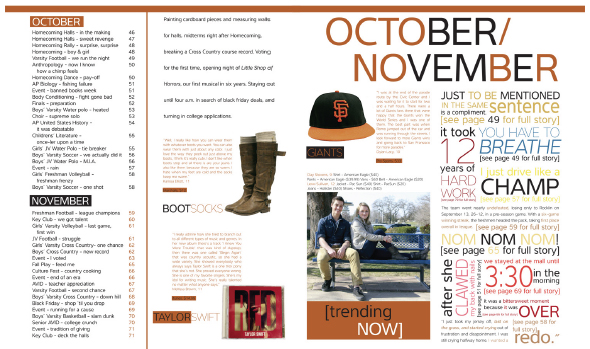
Thinking about types of themes
Written by Crystal Kazmierski
A good yearbook tells the story of a year.
A great one tells it with style and flair.
That’s where theme comes in. Think of theme as the personality behind the yearbook. It’s what makes one book stand apart from another. The best themes help you define the year through any combination of words, phrases, colors, graphics, angles and voices. It’s good to find a theme that is specific enough to be recognized and understood, yet open enough to allow the book to evolve with the unfolding of the school year.
Here are some different types of themes. Any of these could be the right choice for your book.
Verbal theme
A traditional way to approach theme is through the use of catch-phrase expressions. These might be popular phrases or plays on words that allow staffs to carry out the theme in various sections of the book. These types of themes can be especially powerful if they have a direct connection to what is happening at school. For instance, a school that is going from a traditional to a block schedule might play off of a common expression like “Around the Block” and show how the new schedule influenced every area of student life.
Visual theme
Colors, graphics and fonts that relate to the year can create a stunning, eye-catching approach to unifying the book without saying a single theme-related word. Bold, vibrant colors with large, hard-edged graphics will project a totally different personality from a book colored in subtle earth tones, simple fonts and understated designs. The first would work for a year that was spirited and “in your face;” the second tells the story of a quieter or more status quo year.
Concept theme
Often based on some kind of identity or psychological angle, concept themes will only work if students can understand and relate to them. The yearbook is not the place to take things too seriously, nor is it the place where students are going to “discover” who they are. Concept themes can be amazing when done well. When poorly executed, they will leave readers confused or, even worse, bored.
Calendar theme
Some staffs prefer to tell the story of their year chronologically because it allows them to cover more topics. This could be as simple as arranging events in the order in which they occurred, or it might mean covering several events on a single spread as part of a week-by-week look at the year. The challenge with calendar coverage is to figure out where certain academics might fit in, or where to put the mug shots in terms of weekly organization.
Comments are closed.

